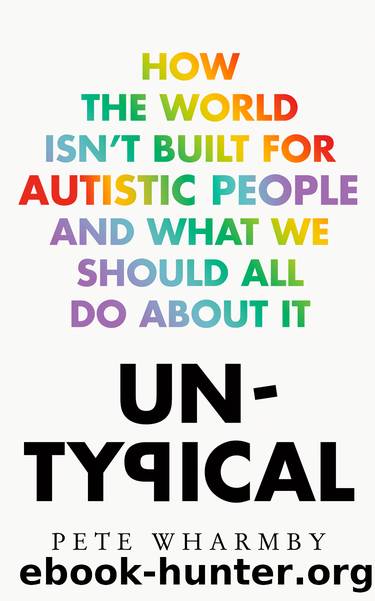Untypical by Pete Wharmby

Author:Pete Wharmby
Language: eng
Format: epub
Publisher: HarperCollins Publishers
Published: 2023-01-26T11:47:34+00:00
Burnout
I hesitate to even begin this section. Iâve always found autistic burnout difficult to talk about, whether when speaking publicly, or when writing my blogs or my threads on Twitter. This is because itâs indelibly linked in my mind to my experience of severe depression and, at times, especially around 2016 or so, attempted suicide. This is not to add a layer of hyperbole to an already difficult concept; itâs simply to show how autistic burnout can leave an autistic person feeling broken, potentially forever.
All of this is made even more complicated by the fact that autistic burnout is still relatively unexplored and unresearched. Things are improving, but like almost everything in medicine, it takes considerable time for new ideas and medical science to trickle down to the frontline of general practitioners and nurses. As such, if (or when) an autistic person goes to their first port of call for medical assistance, theyâre still likely to be met with blank looks, poor-quality assumptions and a total lack of support. Any autistic person who has experienced burnout, though, can confirm that itâs absolutely real. And it can be deadly.
A lot is made of statistics that show that autistic people have a much lower life expectancy than their neurotypical brethren. Depending on which set of stats you pay attention to, the life expectancy of autistic people balances out at either around thirty-six years old, or a little later at fifty-four. Both of these figures take into account many variables, from accidents to deaths caused by what we could call comorbid conditions. Of course, this does not mean that any autistic person you know will definitely be dead by their mid-fifties. Rather itâs a signal of alarm that autistic people are dying much younger than they should â an alarm that really needs to be heard and reacted to. There are a whole host of factors that can drag down an autistic lifespan, many of which Iâve covered elsewhere in this book, but probably the most insidious (as well as potentially the most preventable) is suicide.
As Iâve already mentioned, autistic people are three times more likely to die as a result of suicide than the general population. Studies have shown that over 60 per cent of autistic people have at some point seriously contemplated taking their own life.â
Given the myriad struggles we face, many of which Iâve tried to explain in these pages, these statistics â while extraordinary â shouldnât be shocking. Thereâs next to zero support available for the vast majority of autistic adults. Despite depression and suicidal ideation being a big part of the reason why I received a diagnosis of autism back in 2017, Iâve been given no support from the NHS since my diagnosis, having been sent on my way with a handful of mediocre pamphlets and a âgood luckâ from the psychiatrist. Weâre left to try to figure it all out on our own, and if it hadnât been for the supportive network of autistic people online I fear my own personal outcome may have been bleaker.
Download
This site does not store any files on its server. We only index and link to content provided by other sites. Please contact the content providers to delete copyright contents if any and email us, we'll remove relevant links or contents immediately.
| Allergies | Asthma |
| Autism & Asperger's Syndrome | Cystic Fibrosis |
| Down Syndrome | Eating Disorders |
| Epilepsy | Learning Disorders |
| Lice | Special Needs Children |
I Capture the Castle by Dodie Smith(1579)
Aspergirls by Rudy Simone(1366)
Be Different by John Elder Robison(1334)
Autism's False Prophets by Paul A. Offit(1245)
My Child's Different by Elaine Halligan(1233)
Smart but Scattered—and Stalled by Richard Guare(1199)
101 Tips for the Parents of Boys with Autism by Ken Siri(1158)
What's Making Our Children Sick? by Michelle Perro(1158)
Asperger Syndrome (Autism Spectrum Disorder) and Long-Term Relationships by Ashley Stanford(1118)
ADHD by Mark Selikowitz(1109)
An Adult with an Autism Diagnosis by Gillan Drew(1074)
Girlish by Lara Lillibridge(1072)
Nerdy, Shy, and Socially Inappropriate by Cynthia Kim(1059)
Animal-assisted Interventions for Individuals with Autism by Temple Grandin(1040)
On Immunity: An Inoculation by Biss Eula(1032)
Seeing Ezra by Kerry Cohen(1015)
Overcoming ADHD by Stanley I. Greenspan & Jacob (con) Greenspan(995)
Why Gender Matters by Leonard Sax M.D. Ph.D(984)
Sarah's Child (Hqn Romance) by Linda Howard(983)
